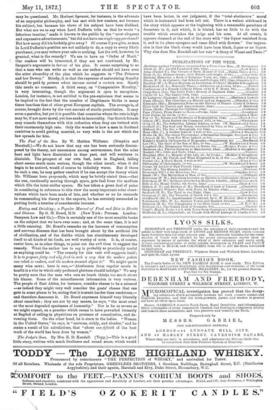Sampson Low and Co.)—This is certainly one of the most
sensible books on the subject that we have ever seen ; and, at the same time, it is not a little amusing. Dr. Beard's remarks on the increase of consumption and nervous diseases that has been brought about by the artificial life of civilization, and of the dislike which has simultanonsly developed itself to all kinds of fat foods, are well worthy of note. It is, of coarse, easier here, as in other things, to point out the evil than to suggest the remedy. What the author has to say is probably as practically useful as anything could be. "The-remedy for this vast evil suggests itself; it is to prepare fatty and oily food in such a way that the modern palate vxn relish or endure, and the modern stomach digest it." We might quote many wise saws ; here is one,—" Abstinence from regular meals in health is a vice in which only professed gluttons should indulge." We may he pretty sure that the man who eats no lunch thinks too much about his dinner. Some of the miscellaneous information is very curious. The people of East Africa, for instance, consider cheese to be a mineral —as indeed they might very well consider the goats' cheese that one gets in some places to be, seeing that it is much harder than sandstone,— and therefore denounce it. Dr. Beard expresses himself very liberally about cannibals ; they are not by any means, he says, "the most cruel or the most degraded specimens of humanity.' Nor is he so severe as we might expect, on a practice which seems to have prevailed formerly at Bagdad of calling in physicians on pretence of consultation, and de- vouring them. On the other hand, he is stern to the ladies. "Woman in the United States," he says, is "nervous, sickly, and slender," and he states a result of his calculations, that "about one-fiftieth of the best work of the world has been done by women."


































 Previous page
Previous page